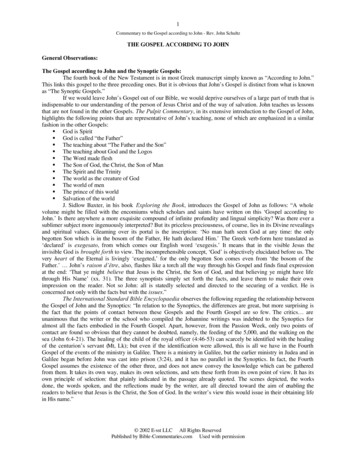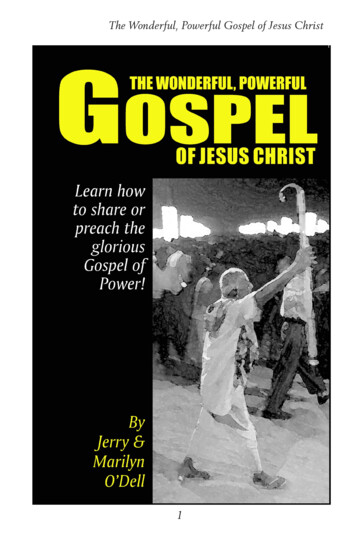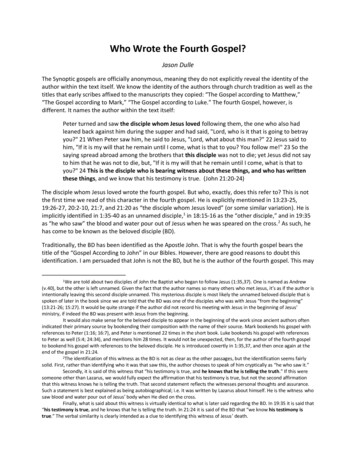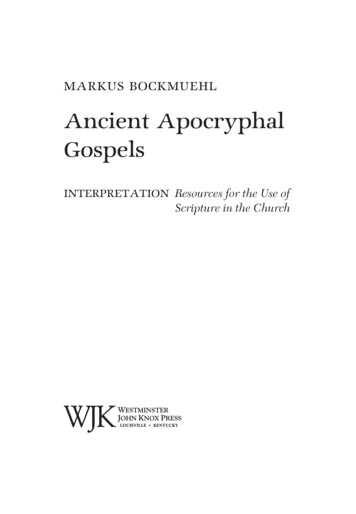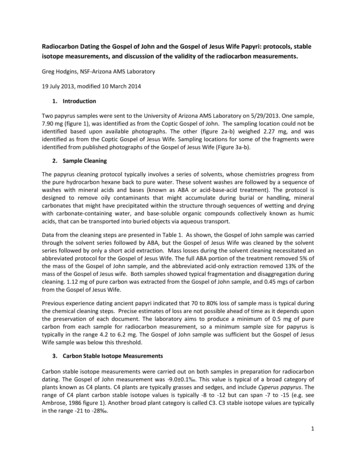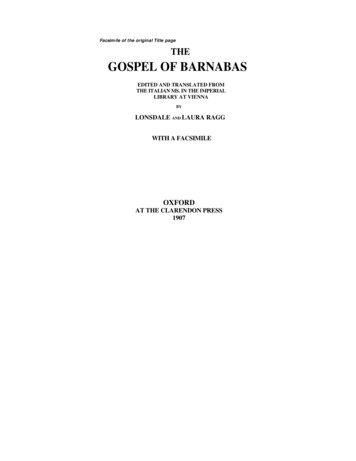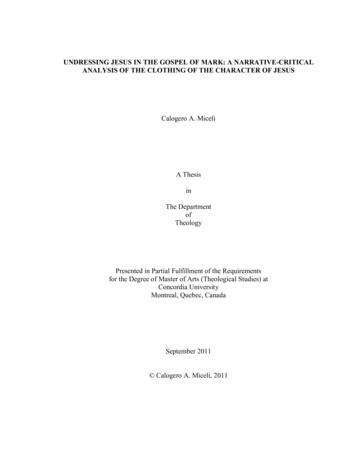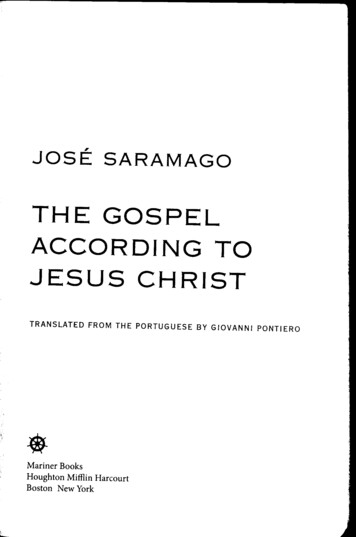
Transcription
JOSE SARAMAGOTHE GOSPELACCORDING TOJESUS CHRISTTRANSLATED FROM THE PORTUGUESE BY GIOVANNI PONTIEROMariner BooksHoughton Mifflin HarcourtBoston New York
Second Mariner Books edition 2020 Jose Saramago e Editorial Caminho SA, Lisboa — 1991English translation copyright 1994 by Houghton Mifflin Harcourt PublishingCompanyAll rights reserved.For information about permission to reproduce selections from this book,write to trade.permissions@hmhco.com or to Permissions,Houghton Mifflin Harcourt Publishing Company,3Park Avenue, 19th Floor, New York, New York 10016.hmhbooks.comThis is a translation of O Evangelho segundo Jesus Cristo.Library of Congress Cataloging-in-Publication DataSaramago, Jose.[Evangelho segundo Jesus Cristo. English]The Gospel according to Jesus Christ/Jose Saramago; translatedfrom the Portuguese by Giovanni Pontiero.p. cm. — (A Harvest book)ISBN 9780156001410 (pb)1.Jesus Christ — Fiction. I. Pontiero, Giovanni. II.Title.[PQ9281.A66E913 1994b]869.3'42—dc20 94-19494Designed by Trina StahlPrinted in the United States of AmericaDOC27
FOR PILAR
XORASMUCH AS MANY HAVE TAKEN IN HAND TO SET FORTH IN ORDERa declaration of those things which are most surely believed amongus, even as they delivered them unto us, which from the beginningwere eyewitnesses, and ministers of the word; it seemed good tome also, having had perfect understanding of all things from thevery first, to write unto thee in order, most excellent Theophilus,that thou mightest know the certainty of those things, wherein thouhast been instructed.Luke 1.1-4Q uod scripsi, scripsi.What I have written, I have written.Pontius Pilate
THE SUN APPEARS IN ONE OF THE UPPER CORNERS OF THErectangle, on the left of anyone looking at the picture.Representing the sun is a man's head that sends out raysof brilliant light and sinuous flames, like a wavering com pass in search of the right direction, and this head has atearful face, contorted by spasms of pain that refuse to abate.The gaping mouth sends up a cry we shall never hear, fornone of these things is real, what we are contemplating ismere paper and ink, and nothing more. Beneath the sunwe see a naked man tied to a tree trunk with a cloth aroundhis loins to cover those parts we call private, and his feetare resting on a piece of wood set crosswise, to give himsupport and to prevent his feet from slipping, they are heldby two nails driven deep into the wood. Judging from theanguished expression on the man's face and from his eyes,which are raised to heaven, this must be the Good Thief.His ringlets are another reassuring sign, for it is well knownthat this is how angels and archangels wear their hair, andso it would appear that the repentant criminal is alreadyascending to the world of heavenly beings. Impossible to1
say whether the trunk is still a tree that has been arbitrarilyturned into an instrument of torture while continuing todraw nourishment from the soil through its roots, inas much as the lower part of the picture is covered by a manwith a long beard. Richly attired in loose, flowing robes,he is looking upward but not toward heaven. This solemnposture and sad countenance must belong to Joseph of Arimathaea, because the only other person who comes tomind, Simon of Cyrene, after being forced to help thecondemned man carry his cross, as was the practice whenthese executions took place, went about his own affairs,thinking more of a business transaction that called for anurgent decision than of the sufferings of a miserable wretchabout to be crucified. Joseph of Arimathaea is that affluentand good-hearted man who donated a grave for the burialof the greatest criminal of all, but this act of generositywill be to no avail when the time comes to consider hisbeatification, let alone canonization. All he has on his headis the turban he always wears outdoors, unlike the womanin the foreground of the picture, whose hair hangs all theway down her back as she leans forward, enhanced bythe supreme glory of a halo, in her case one edged withthe finest embroidery. The kneeling woman must be Mary,because, as we know, all the women gathered here havethat name, with one exception, she who is also calledMagdalene. Anyone viewing this picture who knows thefacts of life will swear immediately that this is the womancalled Magdalene, for only someone with her disreputablepast would have dared appear at such a solemn occasionwearing a low-cut dress with a close-fitting bodice to em phasize her ample bosom, which inevitably draws the lewdstares of passing men and puts their souls at grave risk ofbeing dragged to perdition. Yet the expression on her faceis one of contrition, and her wilting body conveys nothingother than her sorrowing soul, which we cannot ignore,even if it is hidden by tempting flesh, for this woman could
be completely naked, had the artist so chosen to portrayher, and still she would deserve our respect and venera tion. Mary Magdalene, if that is her name, is holding toher lips the hand of another woman, who has collapsed tothe ground as if bereft of strength or mortally wounded.Her name is also Mary, second in order of appearance butundoubtedly the most important Mary of all, if the centralposition she occupies in the lower part of the picture hasany significance. Apart from her grieving expression andlimp hands, nothing can be seen of her body, covered as itis by the copious folds of her mantle and by a tunic tied atthe waist with a coarsely woven cord. She is older thanthe other Mary, which is reason enough, although not theonly reason, why her halo should be more elaborate, atleast that is what one would conclude in the absence ofmore precise information about the privileges of rank andseniority observed at that time. Considering, however, theenormous influence of this iconography, only an inhabi tant of another planet, where no such drama has ever beenenacted, could fail to know that this anguished woman isthe widow of a carpenter named Joseph and the mother ofnumerous sons and daughters, although only one of herchildren was decreed by fate, or whoever governs fate, toachieve a little renown during his life and a great deal moreafter his death. Reclining on her left side, Mary, the motherof Jesus, rests her forearm on the hip of another woman,also kneeling and also named Mary, who might well bethe real Mary Magdalene although we can neither see norimagine the neckline of her tunic. Like the first woman inthis trinity, she lets her long tresses hang loose down herback, but to all appearances they are fair, unless it is onlyby chance that the pen strokes are more delicate here, leav ing empty spaces between the locks and thus allowing theengraver to lighten the tone. We are not trying to provethat Mary Magdalene was in fact blond, but simply pointto the popular belief that women with blond hair, whether3
it be natural or dyed, are the most effective instruments ofsin. Mary Magdalene, who, as everyone knows, was aswicked a woman as ever lived, must have been blond ifwe accept the opinion held, for better or worse, by half ofmankind. It is not, however, because this third Mary hasskin and hair fairer than the first that we suggest, despitethe damning evidence of the first's exposed bosom, thatthe third is the Magdalene. What confirms her identity isthat this third Mary, as she distractedly supports the limparm of the mother of Jesus, is looking upward, and herenraptured gaze ascends with such power that it appears toelevate her entire being, it is a fight that outshines the haloalready encircling her head, a fight that overpowers everythought and emotion. Only a woman who has loved asmuch as we believe Mary Magdalene loved could possiblyhave such an expression, it is she and no other, and thuswe rule out the woman standing beside her. This is thefourth Mary, her hands half raised in a gesture of piety andher expression vague, she is accompanied on this side ofthe engraving by a youth barely adolescent, his knee bentlanguidly while with an affected and theatrical right handhe presents the four women playing out the poignant dramain the foreground. This is John, who looks so youthful,his hair in ringlets and his lips trembling. Like Joseph ofArimathaea, he also blocks some of the picture, his bodyconcealing the foot of the tree on the other side, where nobirds nest. All we see at the top is a second naked manhoisted into the air and bound and nailed to the wood likethe first thief, but this one has smooth hair and his eyesare lowered, perhaps still capable of seeing the ground be low. His thin face arouses our compassion, unlike the thirdthief on the other side, who even in the final throes oftorment defiantly shows his face, which was not always sopale, for thieving gave him a good living. Thin and smoothhaired, the second man bows to the earth that will devourhim, this pathetic creature condemned to both death and
hell must be the Bad Thief, an honest man when all is saidand done, who, free of divine and human laws, did notpretend to believe that sudden repentance suffices to re deem a whole life of evil. Above him, also weeping andwailing like the sun in front, the moon can be seen in theguise of a woman with the most incongruous ring in oneear, an unprecedented liberty no artist or poet is likely torepeat. Both sun and moon illuminate the earth in equalmeasure, but the ambience of light is circular and shad owless, causing everything on the distant horizon to standout clearly, turrets and walls, a drawbridge across a moatwhose water glistens, Gothic arches, and, on the crest ofthe farthest hill, the motionless sails of a windmill. Some what closer, in this deceptive perspective, four horsemenin armor and helmets, bearing lances, proudly parade theirhorses with admirable dexterity, but they appear to havecome to the end of their display and are making farewellgestures to an invisible audience. The same impression ofclosing festivities is given by that foot soldier who is onthe point of going off, carrying something in his right handthat could be a cloth, perhaps even a mantle or tunic, whiletwo more soldiers look annoyed, frustrated, as if they hadlost at gambling, although from afar it is difficult to tellwhat is in their minute faces. Hovering over these com mon soldiers and the walled city are four angels, two ofthem portrayed full length. They weep and mourn, withthe exception of the angel who solemnly holds a goblet tothe crucified man s right side in order to collect the lastdrop of blood from a lance wound. In this place known asGolgotha, many have met the same cruel fate and manyothers will follow them, but this naked man, nailed byhands and feet to a cross, the son of Joseph and Mary,named Jesus, is the only one whom posterity will remem ber and honor by inscribing his initials in capitals. So thisis he whom Joseph of Arimathaea and Mary Magdaleneare gazing upon, this is he who causes the sun and moon5
to weep and who only a moment ago praised the GoodThief and despised the Bad Thief, failing to understandthat there is no difference between them, or, if there is adifference, it lies in something else, for good and evil donot exist in themselves, each being merely the absence ofthe other. Shining above his head with a thousand raysbrighter than those of the sun and moon put together is aplacard in Roman letters proclaiming him king of the Jews,surrounded by a wounding crown of thorns like that worn,without their even knowing and with no visible sign ofblood, by all who are not allowed to be sovereigns of theirown bodies. Jesus, unlike the two thieves, has nowhere torest his feet, the entire weight of his body would be sup ported by his hands nailed to the wood had he not lifeenough left in him to hold himself erect over his bent legs,but that life is nearing its end as the blood continues toflow from the abovementioned wound. Between the twowedges that keep the cross upright and that have also beendriven into the dark ground, making a gaping wound thereas irremediable as any human grave, we see a skull, also ashinbone and a shoulder blade, but what concerns us is theskull, for this is what Golgotha means, skull. No one knowswho put these human remains here or for what purpose,perhaps it was simply a sly reminder to these poor wretchesabout what awaits them before they turn at last to earth,dust, and nothingness. But there are some who claim thatthis is Adam's skull, risen from the deep murk of ancientgeological strata and, because it can not now return there,eternally condemned to behold its only possible paradisewhich is forever lost. Farther back, in the same field wherethe horsemen execute one last maneuver, a man is walkingaway but looking back in this direction. In his left hand hecarries a bucket, and in his right a staff. At the tip of thestaff there ought to be a sponge, not easy to see from here,and the bucket, one can safely bet, contains water withvinegar. One day, and forever after, this man will be much6
maligned, accused of having given Jesus vinegar out of spiteand contempt when he asked for water, but the truth isthat he offered him vinegar and water because at that timeit was one of the best ways of quenching thirst. The manwalks away, does not wait for the end, he did all he couldto relieve the mortal thirst of the three condemned men,making no distinction between Jesus and the thieves, be cause these are things of this earth, which will persist onthis earth, and from them will be written the only possiblehistory.7
NIGHT IS FAR FROM OVER. HANGING FROM A NAIL NEAR THEdoor, an oil lamp is burning, but its flickering flame, likea small, luminous almond, barely impinges on the dark ness, which fills the house from top to bottom and pene trates the farthest corners, where the shadows are so densethat they appear to form a solid mass. Joseph awoke witha fright, as if someone had roughly shaken him by theshoulder, but he must have been dreaming, because he livesalone in this house with his wife, who has not so much asstirred and is fast asleep. Not only is it unusual for him towake in the middle of the night, but he rarely opens hiseyes before daybreak, when the gray, cold morning lightbegins to filter through the chink in the door. How oftenhe has thought of repairing the door, what could be easierfor a carpenter than to cover the chink with a piece ofwood left over from some job, but he is now so accus tomed to seeing that vertical strip of light when he openshis eyes in the morning that he has reached the absurd con clusion that without it he would be trapped forever in theshadows of sleep, in the darkness of his own body and the8
darkness of the world. The chink in the door is as much apart of the house as the walls and ceiling, as the oven andearthen floor. In a whisper, to avoid disturbing his wife,who was still asleep, he recited words of thanksgiving,words he said each morning upon returning from the mys terious land of dreams, Thanks be to You, Almighty God,King of the Universe, who has mercifully restored my soulto life. Perhaps because he had not fully regained the powerof all five senses, five unless at that time people were notyet aware there were five or, conversely, had more andwere about to lose those that would serve little purposenowadays, Joseph watched his body from a distance whileit slowly was occupied by a soul making its gradual re turn, like trickling waters as they wend their way in rivu lets and streams before penetrating the earth to feed sapinto stems and leaves. Looking at Mary as she lay besidehim, Joseph began to realize just how laborious this returnto wakefulness could be, and a disturbing thought came tohim, that this wife of his, fast asleep, was really a bodywithout a soul, for no soul is present in a body while itsleeps, otherwise there would be no sense in our thankingGod each morning for having restored our souls as weawaken. Then a voice within him asked, What thing orperson inside us dreams what we dream, and then he won dered, Are dreams perhaps the soul's memories of the body,and this seemed a reasonable explanation. Mary stirred,could her soul have been near at hand, already here in thehouse, but she did not awaken, no doubt in the midst ofsome troubled dream, and after heaving a deep sigh like abroken sob she drew closer to her husband, with a sensuousness she would never have dared indulge while awake.Joseph pulled the thick, rough blanket over his shouldersand snuggled up close to Mary. He could feel her warmth,perfumed like a linen chest filled with dried herbs, gradu ally penetrate the fibers of his tunic and merge with theheat of his own body. Then slowly he closed his eyes,9
stopped thinking, and, oblivious to his soul, sank back intoa deep sleep.When he woke again, the cock was crowing. A dim,grayish light seeped through the chink in the door. Havingpatiently waited for the shadows of night to disperse, timewas preparing the way for yet another day to reach theworld. Because we no longer live in that fabulous age whenthe sun, to whom we owe so much, was so generous thatit halted its journey over Gibeon in order to give Joshuaample time to overcome the five kings besieging the city.Joseph sat up on his mat, drew back the sheet, and at thatmoment the cock crowed a second time, reminding himthat there was another prayer of thanksgiving to be said.Praise be to You, O Lord, our God, King of the Universe,who gave the cock the intelligence to distinguish betweennight and day, prayed Joseph, and the cock crowed for athird time. Usually, at the first sign of daybreak all thecocks in the neighborhood would crow to one another,but today they remained silent, as if their night had notyet ended or was just beginning. Joseph looked at his wife sface, puzzled by her deep slumber, since normally theslightest noise awakened her, as if she were a bird. Somemysterious power appeared to be hovering over Mary,pressing her down without completely immobilizing her,for even in the shadows her body could be seen to tremblegently, like water rippling in the breeze. Could she be ill,he wondered, but he was distracted from this worryingthought by a sudden urge to urinate, and this, too, wasunusual. He rarely felt the need to relieve himself at thisearly hour or with such urgency. Slipping quietly fromunder the sheet to avoid waking his wife, for it is writtenthat a man should do everything possible to maintain hisself-respect, he cautiously opened the creaking door andwent out into the yard. At that hour of the morningeverything was gray as ash. Joseph headed for the low shedwhere he tethered his donkey, and there he relieved him10
self, listening with dreamy satisfaction to the explosivesound of his urine as it spurted onto the hay scattered onthe ground. The donkey turned its head, two huge eyesshining in the dark, then gave its furry ears a vigorousshake before sticking its nose back into the manger, for aging for leftovers with thick, sensuous lips. Joseph fetchedthe large pitcher used for washing, tipped it sideways, andlet the water pour over his hands, then, drying them onhis tunic, he praised God who in His infinite wisdom hadendowed mankind with the essential orifices and vessels tolive, for if any one of them should fail to close or open asrequired, the result would be death. Looking up at the sky,Joseph was overwhelmed. The sun is slow to appear, inthe sky there is not even a hint of dawn's crimson,'noshade of rose or cherry, nothing except clouds to be seenfrom where he stands, one vast roof of low clouds liketiny flattened balls of wool, all identical and the same shadeof violet, which deepens and glows on the side where thesun breaks through, then across the sky is increasingly darkuntil it merges with what remains of the night on the otherside. Joseph had never seen such a sky, although old menoften spoke of portents in the skies that attested to the powerof God, rainbows that covered half the celestial vault, tow ering ladders that connected heaven and earth, providentialshowers of manna, but never of this mysterious color, whichmight just as easily signify the beginning of the world asthe end, this roof floating above the earth, made up ofthousands of tiny clouds that almost touch one another andreach in all directions like the stones of a wasteland.1error-stricken, he thought the world was ending and hewas the only witness of God's final judgment, the onlyone Silence reigns in heaven and on earth, no sounds canbe heard from the nearby houses, not so much as a humanvoice, a child crying, a prayer or curse, a gust of wind,the bleat of a goat or the bark of a dog. Why are the cocksnot crowing, he muttered to himself, and repeated the11
question anxiously, as if the cocks, crowing might be thelast hope of salvation. Then the sky began to change. Pinktinges and streaks gradually, almost imperceptibly crept intothe violet on the belly of the clouds, until finally it turnedred, then was gone, and without warning the sky ex ploded into light, many shafts of gold that pierced cloudsno longer small but now formidable, enormous barges thathoisted blazing sails and plied a sky that had at last beenliberated. Joseph's fear subsided, his eyes widened in as tonishment and wonder, and with good reason, for he alonewas witnessing this spectacle. In a loud voice he praisedthe Lord of all creation for the eternal majesty of the heav ens, whose ineffable splendors leave men struggling withsimple words of gratitude, Thanks be to You, O Lord, forthis and for that and for that. As he spoke, the tumult oflife, whether summoned by his voice or rushing througha door that had carelessly been left open, invaded the spacepreviously occupied by silence, leaving it scarcely any room,a patch here and there, such as those tiny marshes that themurmuring forests engulf and hide from view. The sunrose and spread its light, a vision of unbearable beauty,two enormous hands sending into flight a shimmering birdof paradise that opened its great tail with a thousand iri descent eyes, causing a nameless bird nearby to burst intosong. A gust of wind hit Joseph in the face, caught hisbeard and tunic, eddied around him like a tiny whirlwindmoving across a desert, unless he was imagining thingsand this was nothing more than the blood rushing to hishead, a shiver going up his spine like a tongue of fire andstirring a quite different urge.Moving as if inside a swirling column of air, Josephwent into the house and shut the door behind him. Hepaused for a moment, waiting for his eyes to become ac customed to the dark. The lamp cast scarcely any light.Wide awake, Mary lay on her back, listening, staring intospace, as if waiting. Joseph quietly approached and slowly12
drew back the sheet. She averted her eyes, began to lift thehem of her tunic, and no sooner had she pulled it to hernavel than he was on top of her, his own tunic hitched tohis waist. Mary's legs now were open, perhaps they hadopened by themselves as she dreamed and she did not closethem out of this sudden lassitude, or else from the pre monition of a married woman who knows her duty. God,who is omnipresent, was there but, pure spirit that He is,'was unable to see how Joseph's flesh touched Mary's, howhis flesh penetrated her flesh as had been ordained, andperhaps He was not even there when the holy seed of Jo seph poured into the holy womb of Mary, both holy, beingthe fountain and chalice of life. For in truth, there are thingsGod Himself does not understand, even though He createdthem. Out in the yard, God could hear neither the gaspthat escaped Joseph's lips as he came nor the low moanMary was unable to suppress. Joseph rested on his wife'sbody no more than a minute, and perhaps less. Pullingdown her tunic and drawing up the sheet, she covered hertece with her arm. Joseph stood in the middle of the room,raised his hands, and, looking up at the ceiling, gave themost heartfelt thanksgiving of all, which is reserved formen, I thank You, Almighty God, King of the Universe,for not having made me a woman. By then, God musthave already abandoned the yard, for the walls did not shakeor cave m, nor did the ground part. All that could be heardwas Mary saying, in that submissive voice one expects fromwomen, Thanks be to You, O Lord, for having made meaccording to Your will. Now, there is no difference be tween these words and those spoken to the angel Gabrielfor clearly anyone who could say, Behold the handmaidenof the Lord, do with me as You will, might just as easilyhave said, instead, this prayer. Then the wife of the car penter Joseph got up from her mat, rolled it up togetherwith that of her husband, and folded the sheet they sharedm common.13
JOSEPH AND MARY LIVED IN A VILLAGE CALLED NAZARETH,a place of little importance and with few inhabitants, inthe region of Galilee. Their house was no different fromthe others, a lopsided cube made of bricks and clay and aspoor as poor could be. No striking examples of imagina tive architecture to be found here. To save on material, thehouse had been built into a hillside, which formed the rearwall and allowed easy access to the flat roof, which alsoserved as a terrace. Joseph, as we know, was a carpenterby trade and fairly capable, although he had neither theskill nor the talent for jobs that required fine workman ship. This criticism should not be taken too seriously, forone needs time to gain experience and acquire skills, andwe must not forget that Joseph is barely in his twentiesand lives in a place with few resources and even fewer op portunities. Nor should a man be measured simply on thebasis of his professional ability. For all his youth, this Jo seph is one of the most honest and pious men of Nazareth,assiduous in attending the synagogue and prompt in car rying out his duties, and while he may not be endowed14
with any special powers of eloquence, he can argue andmake astute observations, especially when given a chanceto use some apt image or metaphor related to his work,carpentry. He does not possess, however, what one mightcall a creative imagination, and during his brief life willnever come up with a memorable parable to be handeddown to posterity, let alone one of those brilliant conceitsso clearly expressed that there is nothing more to say yetso obscure and ambiguous that they intrigue scholars foryears to come.As for Mary s talents, these are even less apparent, butno more than we might expect of a sixteen-year-old girlwho, although married, is still a baby, as it were, for evenin those days people used such expressions. Notwithstand ing her frail appearance, she works as hard as all the otherwomen, carding, spinning, and weaving cloth, baking thefamily bread each morning, fetching water from the welland then carrying it up the steep slope, a large pitcher bal anced on her head and another on her hip. In the late after noon she sets off through the byways and fields of theLord, gathering wood and cutting stubble and filling anextra basket with cow's dung and the thistles and briersthat thrive on the upper slopes of Nazareth, the best thingGod could ever have devised for lighting a fire or braidinga crown. It would have been easier to load everything ontoa donkey's back, but Joseph needs the beast to carry hislumber. Mary goes barefoot to the well, goes barefoot intothe fields, in clothes that are forever getting soiled and tornand that constantly need washing and mending, becausenew clothes are reserved for her husband, women like Marymaking do with very little. When she attends the syn agogue, she enters by the side door, as the law requires ofwomen, and even if she finds thirty other women there,or all the women of Nazareth, or even the entire femalepopulation of Galilee, they must wait until at least ten menarrive for the service, in which the women will participate15
only passively. Unlike Joseph her husband, Mary is nei ther upright nor pious, but she is not to blame for this,the blame lies with the language she speaks if not with themen who invented it, because that language has no femi nine form for the words upright and pious.Now one fine day, four weeks after that unforgettablemorning when the clouds in the sky turned a mysteriousviolet, Joseph happened to be at home. The sun was aboutto set and he was sitting on the floor, eating his food withhis fingers, as was then the custom, while Mary stoodwaiting for him to finish before having her own supper.Neither spoke, for he had nothing to say and she was un able to express what was on her mind. Suddenly a beggarappeared at the gate outside, a rare occurrence in this vil lage, where people were so poor, a fact unlikely to haveescaped the begging fraternity, which had a nose for placeswhere there were pickings, and that was certainly not thecase here. Nevertheless Mary ladled into a bowl a goodportion of the lentils with chopped onions and mashedchickpeas set aside for her own supper, and took it out tothe beggar, who sat on the ground. She did not need herhusband's spoken permission, he merely nodded, for aseveryone knows those were times when words were fewand a simple thumbs down or up was enough to condemna man to death or save him, as in the arenas of ancientRome. The sunset, although quite different, was spectac ular, too, with its myriad wisps of cloud scattered throughthe sky, rose-colored, mother-of-pearl, salmon-pink, cherry,adjectives used here on earth so that we may understandone another, for none of these colors, as far as we know,have names in heaven. The beggar must have gone with out food for three days to have scraped and licked his bowlclean so quickly, and back he comes to return the bowland express his gratitude. Mary, opening the door, findshim standing there, but somehow he looks broader andtaller than before. So it must be true that there is a great16
difference between going hungry and just having eate
This is a translation of O Evangelho segundo Jesus Cristo. Library of Congress Cataloging-in-Publication Data Saramago, Jose. [Evangelho segundo Jesus Cristo. English] The Gospel according to Jesus Christ/Jose Saramago; translated from the Portuguese by Giovanni Pontiero. p. cm. (A Harvest
